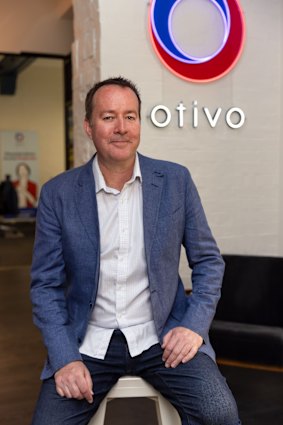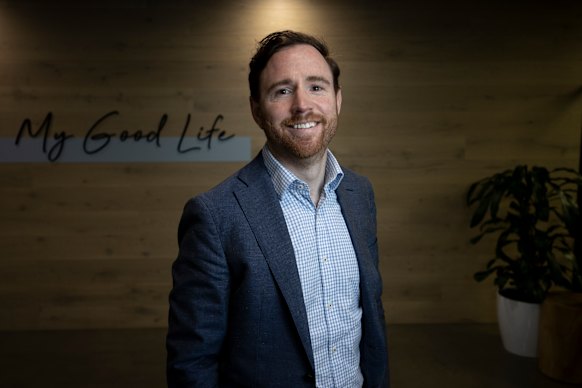Let’s explore the three broad levels of advice now on offer, ranging from no-fee to low fee ($395) and higher (averaging $5000), and what you get for your money. There are many more iterations available, but these three levels demonstrate the range of financial support available to those planning and entering retirement.

Otivo chief executive Paul Feeney.
According to the regulator, ASIC, there are two types of advice intended to help you reach your financial goals:
General advice which does not consider your personal circumstances andPersonal advice that is more specific and tailored to your situation, whether a single issue or comprehensive. Comprehensive can also be ongoing.
Additionally, all advisers must hold an Australian Financial Services Licence (AFSL).
No fee/low-fee, digital-only advice
There are many iterations of this type of advice on offer, some with no charge, others with modest annual subscriptions (typically $90-120). This form of advice is often generated using AI tools which analyse information based upon your inputs of age, work and relationship status, super savings, other assets, debt, and desired retirement date.
The better versions can inform you about the longevity of your super, factoring in age pension eligibility. This advice can also suggest next steps to help you boost your eventual retirement income. Otivo is one such digital platform, and its chief executive, Paul Feeney, believes everybody needs a plan:
“We try to meet individuals where they are today. We deal with a ‘cohort of one’ – a self-directed individual who needs to understand their super, debt and retirement prospects as well as investments and insurance outside super,” he says.
”Our typical customer is asking, ‘What do I need to do next’ rather than asking to be educated about how everything works. They want answers.“
Otivo’s costs range from free to $299 per annum. It does not sell products. Instead, it issues a Statement of Advice which customers can act on or not. Debt management and saving habits are also part of the offering. Feeney claims that it takes less than 10 minutes for users to ‘get a grip’ by entering their information and receiving a full plan.
Loading
Low fee, single-issue advice
This is generally seen as a mid-tier offering, targeted at everyday Australians, often aged 60 or over, who are preparing for, or already in, retirement. David Kennedy is head of advice at Retirement Essentials, a firm that provides this level of advice.
“The trigger for this ‘bite-sized’ advice was the soaring cost of financial advice against a backdrop of declining adviser numbers and a tendency for many advice firms to focus mostly on wealthier clients,” he says.
“This has widened the advice gap and put affordable advice beyond the reach of everyday Australians.”
Kennedy says his company will generally work with clients to help them optimise their super and age pension income, and provide forecasts to give reassurance that they can meet their long-term retirement spending needs.
Self-funded retirees can use consultations to seek a second opinion, or to validate their retirement planning strategy and confirm they are on the right track.
Meetings happen during a 55-minute video call, including strategic advice, scenario analysis, and retirement forecasts. Similarly to lower-cost advice, the focus is on strategy – Retirement Essentials does not sell or recommend financial products.
The price of a 55-minute consultation is $395 and a Statement of Advice is issued after the appointment.
Higher fee, comprehensive advice
Comprehensive advice is what many view as the ‘stereotypical’ financial advice: higher cost, and for those with complex financial affairs, or those who want to dive deep into a financial strategy for their later years.

Financial advisor Robert Devlin from Tribeca.Credit: Arsineh Houspian
Robert Devlin is Head of Advice at Tribeca Financial, and he says his focus is on helping people with what they really hope to achieve – be it leaving work earlier, more life balance or helping out adult kids.
Tribeca works with such ‘aspirers’ on a 10-year road map. Typically, their clients are open to learning and developing financial skills throughout the many different life stages between 40 and 70.
A one-off appointment with a comprehensive Statement of Advice (SOA) is charged at $6,600. Alternatively, clients can pay a monthly fee of $550 across a 12-month period. Meetings are held in person or on Zoom calls.
Robert believes these fees can be easily recouped through good guidance. For instance, he notes, if your super fund was identified to be underperforming by 1.5 per cent, changing this could see you save 7–10 times the value of the fee. Most of Tribeca’s clients come from referrals.
Tackling spending is another area where Tribeca believes its advisers can add value. “It’s also worth remembering that expenses change when you hit retirement. We’re not trying to set budgets but do want to know our clients have the capability to save,” Devlin says.
What do funds offer?
Where do super funds fit into the advice puzzle, you might ask? Once again, it depends.
Under the intra-fund advice regime, many super funds are only set up to provide advice to the member individually, which means that they are unable to extend that advice to the member’s partner, who may be in a different fund.
Loading
Some larger, better-resourced funds offer various tiers of advice – so they will offer intra-fund as well as more comprehensive ‘full service’ advice. The client in this case will be charged directly, as opposed to intra-fund advice, where no fee is charged.
The common sentiment from each of the above three advisers is that every Australian deserves good advice to help them make the most of their retirement. And it’s fair to say that new technologies are leading to solutions that just may make this happen, regardless of the size of your wallet.
Advice given in this article is general in nature and is not intended to influence readers’ decisions about investing or financial products. They should always seek their own professional advice that takes into account their own personal circumstances before making any financial decisions.

